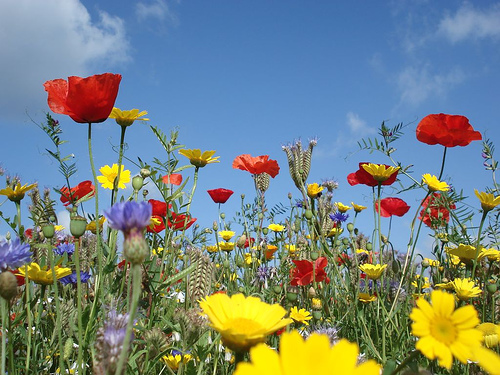
Wildflowers…think back to when you were young…remember seeing the beautiful flowers in the fields and meadows? What child didn’t want to pick flowers for their mother? Today wildflowers can be planted for enjoyment in your own garden areas and will benefit the environment for the bees, birds, butterflies and, yes, the bugs.
Native or naturalized? Wildflowers that are indigenous to the continent are “native” of which, by expert estimates, there are over 20,000 species of flowering plants in North America, belonging to about 300 different families. “Naturalized” refer to flowers that may be common, but not indigenous to the continent, which have been introduced from other parts of the world. One thing that they share in common; however, is that they do just fine growing on their own in nature.
Now that you know you want to plant wildflowers, determine where is the best spot. Do you want to add to existing landscape or start a new area? Is this for your own enjoyment in a private landscape or do you want it to be seen from the road for all to enjoy? Is the look you are trying to create more formal or randomly scattered like in a meadow?
You want to prepare the area where you are planning to grow the wildflowers. Wildflowers don’t need to compete with the grasses and weeds in the area so you will want to begin spraying with a generic RoundUp to clean it up. For fall planting start in September while they are still actively growing as the RoundUp is taken down to the roots of the plant through the leaves. In another week rake the area again, wait a week, then spray again to clean up any emerging weeds. You may need to do this process a few times depending on how “weedy” your area is for planting.
Toward the end of October, rough up the area of the soil so that all the seed comes in good contact (but don’t go any deeper than 1″ or you will bring up more weed seeds). You can roll over the seed or use a drag chain to make sure all seeds are just covered by the soil. You may find it easier to use sand or another medium to mix with the seed at a ratio of 8 parts medium to 1 part seed to get a uniform coverage. If needed, cover with straw and not hay as hay has weed seeds in it and wheat or pine straw does not!
If you aren’t able to get the seeds planted in the Fall, Spring planting will work just as well with the same process. Germination time will depend on the type of flower but is anywhere from 6 days to 28 days. You will then have flowers coming on at all different times. Also, planting seeds that germinate faster than others will cause them to act as a support group to keep the weeds down until the other flowers can germinate and begin growing.
There are different combinations of wildflower seeds for different effects. Try Hummingbird & Butterfly Garden Wildflower Seed Mix, Cottage Garden Wildflower Seed Mix, or Daisy Garden Wildflower Seed Mix.
Add a new dimension to your outdoor space with wildflowers and enjoy!

Tanya says
Is this beautiful wildflower pix available on canvas art? Or how may I obtain a copy of the pix? Thanks!
Rebecca says
This picture was used under the Creative Commons license from jikamajoja at Flickr. I’m not aware of it being used commercially. You might check out iStockPhoto for similar pictures that you can purchase.